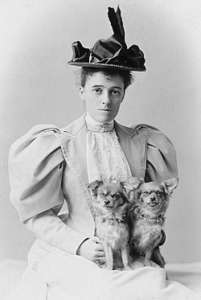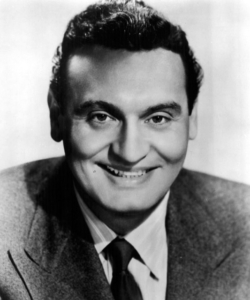REVIEW POTPOURRI: Edith Wharton
 by Peter Cates
by Peter Cates
Edith Wharton
A paragraph from chapter one of the 1920 classic novel The Age of Innocence, by Edith Wharton (1862-1937), depicts the late arrival at the opera of a rich, spoiled central character, Newland Archer:
“When Newland Archer opened the door at the back of the club box the curtain had just gone up on the garden scene. There was no reason why the young man should not have come earlier, for he had dined at seven, alone with his mother and sister, and had lingered afterward over a cigar in the Gothic library with glazed black-walnut bookcases and finial-topped chairs which was the only room in the house where Mrs. Archer allowed smoking. But, in the first place, New York was a metropolis, and perfectly aware that in metropolises it was ‘not the thing’ to arrive early at the opera; and what was or was not ‘the thing’ played a part as important in Newland Archer’s New York as the inscrutable totem terrors that had ruled the destinies of his forefathers thousands of years ago.”
Wharton so powerfully dramatized these “totem terrors” in the “high society” of this novel and in the life of a farmer in the bleak rural Massachusetts of the shorter novelette Ethan Frome.
Benjamin Britten
Benjamin Britten: Albert Herring (1947 comic opera); vocalists Christopher Gillette, Josephine Barstow, Felicity Palmer, Robert Lloyd, Gerald Finley etc.; Steuart Bedford conducting the Northern Sinfonia. Collins Classics 70422, recorded August 11-15, 1996, two compact discs.
English composer Benjamin Britten scored this opera in 1946; its plot is based on a short story by Guy de Maupassant in which villagers celebrate its annual May Day by awarding a cash prize to a village maiden who has remained modest and virtuous in her demeanor and reputation.
The problem is that no worthy candidate is to be found among the young women that particular year so the committee chooses an eligible young store clerk Albert Herring as their honoree for his decorum and moral purity.
Britten’s music has a light-hearted charm and poignance while the performance and recording are splendid. For beginners, though, I would recommend the composer’s Young Person’s Guide to the Orchestra, a beautifully colorful showpiece which displays every instrument in the solo virtuoso spotlight; the four sections of strings, woodwinds, brass and percussion; and at the beginning and end, the full orchestra in all its glory. As a basis for development, Britten chose a passage from English composer Henry Purcell (1659-1695) and worked it with phenomenal imagination.
Afterwards, the listener could move on to the very atmospheric Four Sea Interludes from his opera masterpiece Peter Grimes and then his eloquent War Requiem.
Britten was also a very gifted conductor and left recordings of each work.
Finally I have recordings of Britten conducting Mozart’s Piano Concertos 20 and 27 with Sir Clifford Curzon, Schumann’s Scenes from Faust, Haydn’s 95th Symphony and the Mahler 4th.
Unfortunately, on a personal note, Britten had a tendency to abruptly cut off friendships of long standing due to some real or imagined slight and those former friends were referred to as “Britten’s corpses.”
Will Trent
I have been enjoying the first season of ABC’s series Will Trent which has a detective who has the brilliance of Sherlock Holmes or Hercule Poirot but who is dyslexic.
Frankie Laine
Frankie Laine – The Day Isn’t Long Enough; Isle of Capri – Harry Zeller conducting with pianist Carl Fischer. Mercury 5685, recorded June, 1951, seven inch 45.
In the Beginning; Old Shoes – Paul Weston conducting. Columbia 4-40878, recorded November, 1954, seven inch 45.
For me, the greatest strength of Frankie Laine (1913-2007) was his ability to sing in the style of the great blues vocalists, such as Jimmy Rushing, Billie Holiday, Eddy Howard and Johnny Mercer, whatever the musical category of the particular song- gospel, folk, jazz, pop.
Francesco Paolo LoVecchio was born in Chicago’s Little Italy to Sicilian parents. The family had connections to organized crime, his father serving as Al Capone’s barber while his grandfather was murdered by rival gangsters.
Francesco changed his name to Frankie Laine when he got a job in 1938 as vocalist with a New York City radio station. He numbered Caruso, Bessie Smith and Al Jolson among his favorite singers.
By 1949, when his own records for Mercury (Mitch Miller signed Laine to the label) were best sellers, Jolson (1886-1950), already a fan, told Laine that he would be putting all the other singers out of business.
Both 45s are classy examples of Frankie Laine’s phrasing, timing, delivery and ability to communicate beauty and inner meaning to the listener.
With respect to Laine’s Columbia recordings, when Mitch Miller moved to that label, he took Laine with him.
I interviewed Mitch at Houston’s Lancaster Hotel in 1992 where he told me of his parents’s belief that “You’re not a success unless you bring other people along with you.” He lived by that principle with the success he brought as a producer to such pop artists as Frankie Laine, Tony Bennett, Patti Page, Doris Day, Vic Damone, Guy Mitchell, Percy Faith, the Four Lads, the Brothers Four, Jerry Vale and Johnny Mathis.
Responsible journalism is hard work!
It is also expensive!
If you enjoy reading The Town Line and the good news we bring you each week, would you consider a donation to help us continue the work we’re doing?
The Town Line is a 501(c)(3) nonprofit private foundation, and all donations are tax deductible under the Internal Revenue Service code.
To help, please visit our online donation page or mail a check payable to The Town Line, PO Box 89, South China, ME 04358. Your contribution is appreciated!





Leave a Reply
Want to join the discussion?Feel free to contribute!